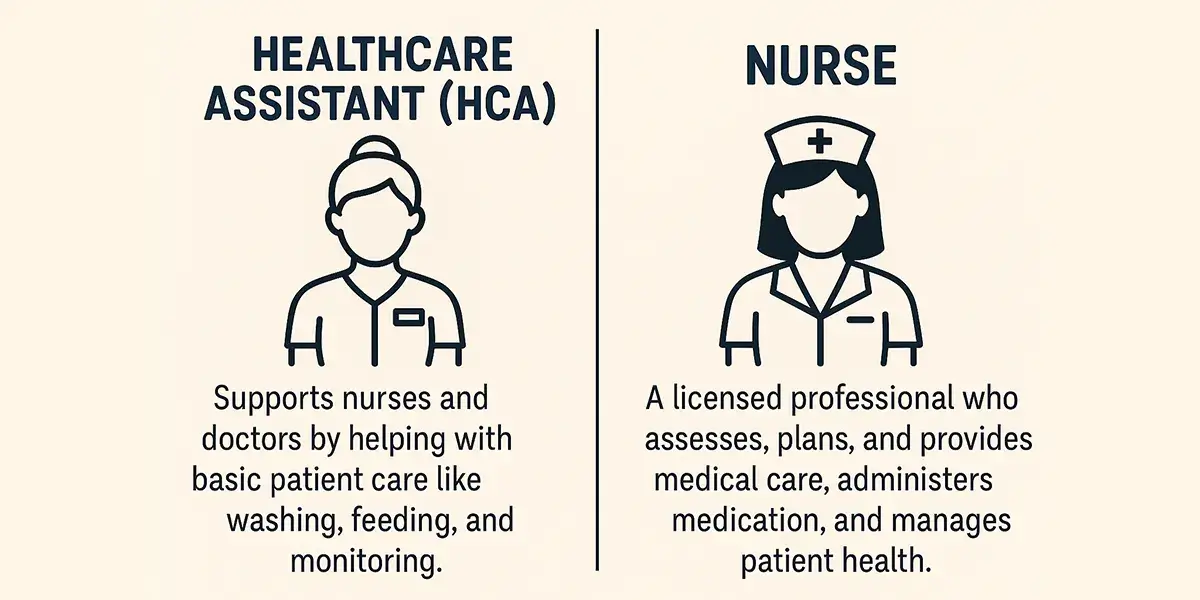When people think of healthcare, they picture nurses catering to patients’ needs or doctors diagnosing problems. However, that’s just a myth.
Behind the scenes, there is a team of talented and educated nurse professionals who manage operations, budgets and care pathways. Healthcare assistants and nurses are among those.
One of the most prominent questions people wonder: Isn’t a healthcare assistant the same as a nurse?
With both roles working together in DNP and Hospitals, many think their roles are interchangeable.
The short answer is No!
A healthcare assistant provides basic support and care under the supervision of nurses.
On the other hand, nurses are involved in providing patient care, developing care plans and assisting the doctors.
So, are you thinking of working in healthcare either as an assistant or a nurse in 2025? Then, understanding the difference between the two is essential.
In this blog, we will explore the key differences between a healthcare assistant and a nurse. You will learn what each role involves, how to get started, pay scale and much more to help you determine which career path is perfect for you.
Come on! Let’s get into the blog.
Overview of Healthcare Assistant
Healthcare Assistants, also known as HCAs, support patients of all ages by providing care under the supervision of nurses.
Furthermore, in the UK, they work across various settings including:
- Nursing Homes
- Private Residences
- DNP
- Hospitals
- NHS trusts
- Other Healthcare centres.
What are the daily responsibilities of an Assistant?
HCAs focus on handling patients’ daily responsibilities.
- Fulfilling patients’ basic needs such as bathing, dressing, and toileting)
- Additionally, observing and reporting
- Taking and recording vital signs like temperature, blood pressure, etc
- Supporting patients with mobility and exercise
- Assisting nurses with basic tasks, such as wound cleaning and equipment setup.
Moreover, a healthcare assistant is the first contact for the patients, often providing them with the emotional and mental support they need.
What are the Entry-Level Qualifications and Training?
The good thing about pursuing the entry-level healthcare assistant role in the UK is that you don’t need to have any sort of qualifications.
However, the employers do require you to have:
- Good English and communication skills.
- Additionally, having a vocational NVQ level 2 or level 3 certification can give you an edge. However, these qualifications can be strict. If you encounter any issues, consider reaching out to the nurse assignment writers. They have expertise and can assist you with your training.
- Also, many employers require you to have the Care Certificate, aka the standard training for all HCAs in the UK.
Moreover, many HCAs enter the healthcare field by completing care apprenticeships or training programs.
The reason?
It provides a good opportunity to gain hands-on experience.
What is the NHS Band For The Healthcare Assistant?
An HCA in the NHS is placed under:
- Band 2 according to the Agenda for Change (AFC) pay system. This is the starting point for them.
- However, those HCAs with higher responsibilities and working hours may move to Band 3.
- Additionally, the starting salary for the healthcare assistant is said to be around £20,000 to £26,000 per year, based on their role. Also, according to community care, the average salary for those aged 21 and over will be £12.21 per hour.
Overview of a Nurse
A nurse is a trained medical expert who is assigned to provide care and support to individuals, families and communities in different health care settings. Also, the nurses have to supervise HCAs and junior staff.
The best thing about becoming a nurse is that they aren’t confined to one field. Instead, they can specialise in different fields such as:
- Pediatrics
- Oncology
- Mental Health
- Emergency Care
- Adult Care, etc.
Moreover, just like HCA, a nurse can work anywhere, including:
- NHS Hospitals
- Schools
- Prisons
- Research Centers
- Community Clinics
- GP surgeries
- Care homes with nursing
What are the daily responsibilities?
The roles and responsibilities of an RN include:
- Assessing patients
- Developing & implementing care plans
- Administering medications & treatments.
- Monitoring & recording vital signs,
- Moreover, providing education & emotional support to patients and their families.
Additionally, they also work closely with other healthcare experts and physicians to provide top-notch patient care. Also, their goal is to help patients achieve optimal health outcomes.
What are the Entry-Level Qualifications?
To become an RN, you need to have:
- ADN or BSN in nursing
- Furthermore, if you are pursuing specialisation, ADSN is essential.
- Also, you need to pass your NCLEX-RN test.
- Complete a BSc (Hons) in Nursing (typically 3 years full-time)
- Register with the Nursing and Midwifery Council (NMC)
- Pass Disclosure and Barring Service (DBS) checks
- Gain practical experience through NHS clinical placements during study.
Also, for advanced roles, training and other qualifications might be required. Becoming a nurse is not easy. Hence, most pupils consider seeking guidance from nurse assignment help services for their studies.
What is the NHS Band for a Nurse?
In the UK’s NHS, nurses are categorised into different bands depending on their roles and specialisations. For example:
- Band 5 is typically for the newly qualified nurses who are starting their career.
- Furthermore, Band 6 represents those who take up the leadership roles.
- Similarly, brands 7 & above are for advanced and specialist nursing positions as they require experience.
Additionally, the pay scale for the nurses in the UK varies, depending on their experience, qualifications and employers.
In general, the salary ranges from:
- £30,000 to £37,000 per year in band 5 for newly appointed nurses.
- Moreover, experienced nurses earn more than £46,104 per year.
Healthcare Assistant Vs Nurse: Side-by-Side Comparison
Now that you have a deeper understanding of HCA and the Nurse. Come on! Let’s have a side-by-side comparison through this table.
| Criteria | HealthCare Assistant | Nurse |
| Qualification |
|
|
| Regulated Body |
|
|
| Salary Range (NHS) |
|
|
| Main Duties |
|
|
| Career Progression |
|
|
| Training Length |
|
|
| Legal Accountability |
|
|
Healthcare Assistants and Nurses are two polar opposite roles. Nurses usually supervise the HCAs in patient care. However, by studying BSN, you can progress to become a nurse associate or RN.
Come on! Let’s have a look at their key differences in detail.
Key Differences Explained
Healthcare Assistant Vs Nurse: What is the key difference between them?
Well, in terms of training length & cost, and responsibilities, they differ from each other.
Come on! Let’s have a look at them:
Training length
- Training to become a healthcare assistant can be completed within weeks or three months, depending on the institute. Moreover, the route to HCA is simple, requiring only the completion of various certifications. The best thing is that the certifications of HCAs are much cheaper. However, if you want to become a nurse, then you need to do a nursing associate or an apprenticeship through different courses.
- On the other hand, to become a nurse, you have to complete a 3-year BSN program along with passing the NCLEX-RN test. Moreover, nursing qualifications are expensive, with their tuition fee starting from £9,535 per annum. The good thing is that the NHS does offer scholarships.
Pay Scale
There is a huge pay scale gap between the HCAs & nurses. While HCAs earn a lower salary based on their roles and responsibilities, nurses earn more due to their advanced role.
Clinical responsibilities
- HCAs are required to handle daily basic tasks of patients, such as bathing, dressing, and checking. Moreover, they are entirely dependent on the nurse for this role.
- On the other hand, nurses have an advanced role. Not only do they have to assist doctors in creating care plans, but they also need to communicate with patients. Also, they need to handle medical procedures and make crucial decisions.
Legal accountability
- Healthcare assistants are not responsible for any actions. And it is because they are under the complete supervision of the nurses.
- In comparison, nurses are held accountable for all their decisions. Additionally, they should be able to meet the MNC standards. Also, they have to follow all the ethical guidelines.
Autonomy in care
- HCAs have a limited decision-making authority. Instead, they work as guided by the nurses.
- On the other hand, nurses have a higher degree of autonomy in care. From handling the care plans to making crucial decisions, delegation and medical administration, they need to perform different roles.
Career development potential
- Well, healthcare assistants do have some career potential. They can proceed to the senior HCAs’ roles. Furthermore, they can even become a nursing associate and then proceed as a nurse via apprenticeship.
- In contrast, the nurses have opportunities like practitioner, ANP, educator, administrator and much more.
Job security or demand
In 2025, due to the healthcare staff shortage, both of the roles are in demand. However:
- The job security for the HCAs might depend on the institution where they work. Furthermore, it also depends on their level of training. Sometimes due to working hours or any other reasons, there might be job uncertainty.
- On the other hand, nurses have high job security because of their skills and training. Additionally, the register of nurses grew by 3.3% between April 2024 and March 2025.
Which Role Suits You The Most?
So now you have learned the difference between the healthcare assistant & nurse, but have no clue which career path to choose?
No worries!
Here are some questions that you need to ask yourself:
- Can you commit to three years of study?
- What are your personal goals, interests and ambitions?
- Do you prefer hands-on care but with minimal research?
- Are you ready to take on the leadership roles?
- Do you want to enter healthcare quickly and grow?
Once you have answered these questions, you will know what career path you will have to pursue.
If you enjoy taking on leadership roles, making decisions, being accountable, caring for patients, and collaborating with doctors, becoming a nurse is the perfect fit for you.
However, if you want to start working in the healthcare industry immediately without any qualifications and prefer an administrative role, you should choose HNA as your career path.
Remember, whether you are choosing HCA or nursing as a career, you need to have personal traits like:
- Empathy
- Compassion
- Communication
- Kindness
- Responsibility
- Team Work
- Accountability
- Emotional Strengths
These skills are necessary for you to handle the challenges of healthcare. Furthermore, whether as an assistant or a nurse, it allows you to provide the best patient care.
How to Become a Healthcare Assistant and Nurse?
So, here comes the most asked question: How do you become a healthcare assistant and a nurse?
Come on! Let’s find out!
How to become a Healthcare assistant?
So, if you have decided that you want to become a healthcare assistant, here is what you need to do:
- Firstly, you need to meet the basic GCSE requirements. Also, make sure that you have strong communication skills.
- Moreover, since there are no official qualifications required, you can start by doing internships. Additionally, you can consider roles as care assistants or volunteer at hospitals, GPs, and other healthcare settings.
- Furthermore, consider pursuing the NVQ Level 2 or Level 3 qualifications. These certifications provide you with the experience, preparing you for real-world roles.
- Work towards developing essential skills, such as patient care, empathy, and problem-solving.
- Consider looking for jobs at NHS Jobs or provide your CV to the local care provider.
A Pro Tip: Tailor your CV to match your job experience and achievements. Also, if you are willing to advance towards nursing associate roles, consider completing your apprenticeships.
How to become a nurse?
For those wondering how to become a nurse, here is what you need to do:
- Firstly, you need to complete your basic GCSE requirements and A-levels.
- Next, determine which career path you want to take. Furthermore, choose the nursing field that you want to specialise in.
- Choose the university where you want to study. Also, complete your three-year BSN.
- Do internships and gain hands-on experience.
- Register with the NMC upon graduation.
Well, if you are interested in becoming a nurse and want to know more about this, consider reading our blog: How to Become a Nurse in the UK.
FAQs
1. Can HCAs Become Nurses?
Yes! Healthcare assistants can progress to the role of nurse by doing apprenticeships or taking admission in nursing universities.
2. Do nurses earn more than healthcare assistants?
Yes! Nurses generally earn more than healthcare assistants due to their critical role, skills, education, achievements, and experiences. They also have better job stability. While nurses earn around £28k+, HCAs earn around £22k – £26k.
3. Can HCAs give injections?
No! Healthcare assistants are not trained or authorised to give injections until they are under supervision or have received appropriate training. This is specifically a nurse’s job.
4. Are nursing associates and nurses the same?
No! Nursing associates are bridging the gap between healthcare assistants and nurses. They provide more critical care than the HNAs. However, you aren’t considered a nurse until you are registered under the NHS.
5. Do I need a degree to be a healthcare assistant?
No! There are no qualifications required to be a healthcare assistant. However, many employers do value good English and communication skills. Also, if you want to progress to an advanced HNA role, having NVQ level 2 and level 3 qualifications is an excellent option. They provide you with a perfect hands-on experience.
6. Where can I find the HCA or Nursing Jobs?
For those of you looking for HCA or nursing jobs, consider visiting NHS Jobs, HealthJobsUK, etc. Moreover, you can consider looking at the local hospital websites.
7. Is There Funding for Nursing Degrees in 2025?
Yes! The NHS support learning fund provides up to a £5,000 grant for nursing degrees in 2025. Furthermore, they also offer additional support for childcare, travel or other problems.
Conclusion
That’s a wrap! Healthcare assistants and nurses both play essential roles in patient care. However, their paths, responsibilities and progression opportunities are different.
HCAs are a more dependent role offering direct, practical support under the supervision of the nurses. Furthermore, it is an excellent entry into the healthcare sector. If you’re someone who likes to provide emotional support but doesn’t want to take on a leadership role, this is the perfect opportunity. Do consider the job stability and the pay, as the salary for the HCAs is lower.
On the other hand, Nurses take on complex clinical tasks, carry legal responsibility and often lead patient care. If you enjoy providing direct patient care, making informed decisions, and taking accountability, this career path is perfect for you.
So, whether you are drawn to the quick start of HCA or aiming for the long-term impact, both careers offer purpose, growth and a chance to make a big difference in one’s life.
Next steps? Choose your career path, browse NHS jobs and get started!




 UK Cities
UK Cities